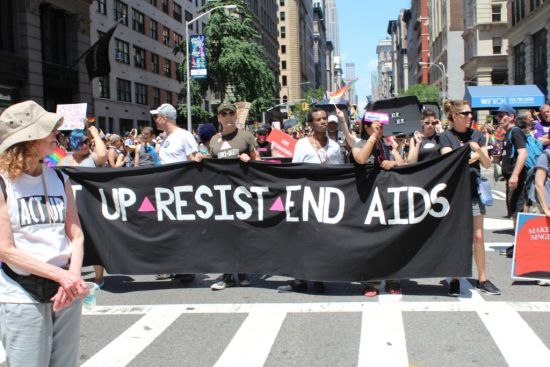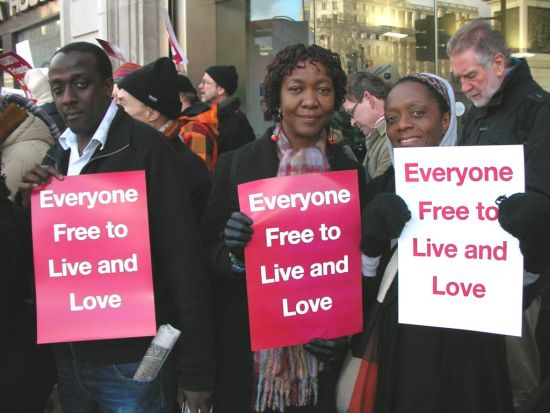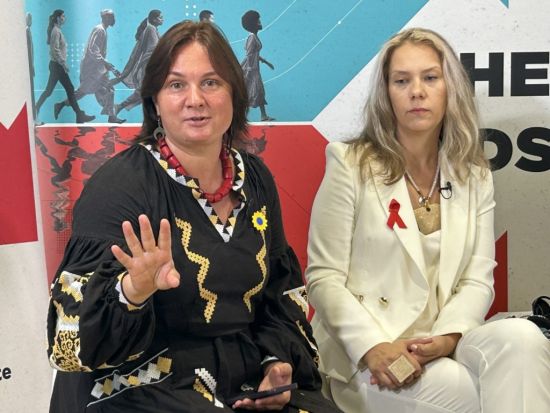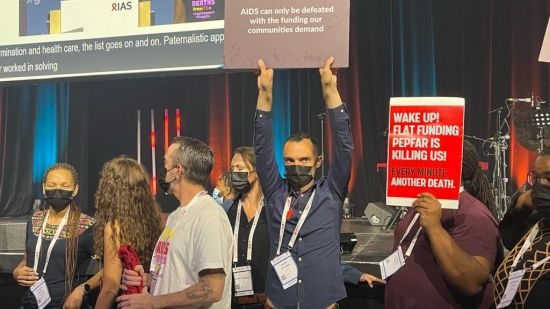Why HIV Could Be Poised for a Monumental Comeback
21/01/2025 | By Beatriz Grinsztejn & Birgit Poniatowski

Act-up protest to end AIDS
The good news first: HIV science has made remarkable progress. While we still lack a vaccine or cure, a single dose of a new long-acting injectable drug can now offer protection against HIV for up to six months.
This breakthrough could revolutionize efforts to curb a pandemic that still claims a life every minute. However, the rise of populism and regressive governance threatens to unravel many hard-won gains in HIV and public health.
In the United States, the highly successful and bipartisan President’s Emergency Plan for AIDS Relief (PEPFAR) is under attack, and its potential undoing could cut millions off from access to life-saving medication. The program is estimated to have saved some 26 million lives over the past two decades. It was conceived out of concerns that the AIDS pandemic could devastate generations of people in lower- and middle-income countries and fuel political instability.
The National Institutes of Health (NIH) faces scrutiny over its funding of HIV research, with some policymakers questioning the validity of decades of peer-reviewed science.
Robert F Kennedy Jr., the Trump administration’s pick for the next US health secretary, is a vaccine sceptic who has for many years falsely linked vaccines to autism. Kennedy is also on record denying the causal relationship between HIV and AIDS. Treating evidence-based research as opinions that can be traded for other views without any scientific validity is a grave danger, especially if it takes hold at the highest levels of government.
Human rights restrictions continue to challenge the HIV response in regions most affected by the epidemic. In 2024, Uganda upheld one of the world’s harshest anti-gay laws. At least half of the 67 countries that still criminalize same-sex relationships are in sub-Saharan Africa, where HIV burdens are highest. Anti-gay laws correlate with higher HIV rates globally. In Russia, punitive drug laws and restrictive LGBTQ+ policies continue to drive the world’s fastest-growing HIV epidemic.

A protest against Uganda’s earlier attempts to pass a ‘kill the gays’ law in 2012
Undermining science and human rights risks reversing progress and invites the next pandemics. The re-emergence of Mpox and H5N1 bird flu are warning shots—HIV could be next. But there’s a blueprint that can do the opposite and end HIV for good:
Defend human rights
Protecting human rights is not merely an ideological stance; it’s a proven public health strategy. Punitive laws and discriminatory policies harm those most in need and undermine HIV prevention and care.
Urgent legal reforms are required to protect key populations and repeal laws that criminalize LGBTQ+ communities, migrant workers, sex workers, people who inject drugs, and incarcerated individuals. Empowering civil society organizations—including those of people living with HIV—has been and continues to be the bedrock of the HIV response.
Protect shrinking civil society spaces
One of the most powerful lessons from four decades of HIV response is that successful public health efforts require an engaged, empowered civil society. Activism by those most affected has shaped the HIV response, from trial design to health policy.
Civil society organizations provide vital services, especially for those whose access to public health systems is hindered by stigma and discrimination. Protecting these organizations—rather than defunding and persecuting them—saves lives. Yet, over 50 countries have laws restricting the foreign funding that many HIV initiatives depend on.
As conveners of the world’s largest HIV conferences, we at the International AIDS Society feel the impact of shrinking civil society spaces. The countries most affected by HIV are often off-limits for our conferences due to safety concerns for the most marginalized and persecuted.
In other instances, governments have threatened to interfere with the agendas and debates of our gatherings, compromising our movement’s independence. We demand the protection of civil society spaces so that people can organize and assemble freely—because a functioning public health response depends on it.

HIV activists Ganna Dorbach and Elena Rostokina from Eastern Europe, speaking at IAS 2024 in Munich, blamed stigma for the rapid spread of HIV in their region, particularly in Russia.
Depoliticize public health
Despite the lessons of the COVID-19 pandemic, efforts in 2024 by WHO member states to draft a new pandemic treaty were frustrated. The treaty was meant to address gaps exposed by COVID-19—such as inequitable vaccine distribution and lack of global coordination.
The failure to agree on a treaty text highlighted how geopolitical and economic power increasingly shapes international health policy to the detriment of global health equity. It’s vital that this is resisted in ongoing negotiations, and a strong treaty text premised on public health is adopted at the World Health Assembly this coming May.
The likely return of the Global Gag Rule is another example of how unrelated political agendas undermine the HIV response. First introduced under the Reagan administration and reinstated under the first Trump government, it bars international organizations from receiving US funding if they provide abortion services or related information.
Paradoxically, this policy increases reliance on abortion by limiting access to contraception. A study published in PNAS found it contributed to 360,000 new HIV acquisitions in just four years (2017-2021). With two-thirds of international HIV funding coming from the U.S., reintroducing the Gag Rule would be devastating.
Strengthen International Cooperation

Protestors call for greater investment in HIV at the IAS conference in 2022.
According to the Joint United Nations Programme on HIV/AIDS (UNAIDS), its funding in 2024 has dipped to less than 50% of the resources available in 2015, and other essential multilateral health institutions such as the World Health Organization (WHO) are also struggling for funding.
Institutions such as PEPFAR and the Global Fund to Fight AIDS, Tuberculosis and Malaria have between them saved some 90 million lives. They are worth defending, not defunding. Funding shortfalls and inequities undermine global health cooperation
Progress happens when science, policy, and civil society unite. The HIV movement is built on transformative social movements—women’s rights, LGBTQ+ rights, and civil rights—which have shown that inclusive, collaborative approaches drive sustainable change.
Today, we must build on this legacy, organize, push back against anti-human rights movements, and defend science as the foundation of our societies’ progress. The alternative is a place humanity has been many times before, offering little but regression and pain.

Beatriz Grinsztejn is President of the International AIDS Society.

Birgit Poniatowski is Executive Director of the International AIDS Society.
Image Credits: Kerry Cullinan, Peter Tatchwell Foundation..
Contact:
Health Policy Watch
info@healthpolicy-watch.org
Source: Health Policy Watch
https://healthpolicy-watch.news/why-hiv-could-be-poised-for-a-monumental-comeback/
"Reproduced with permission - Health Policy Watch"
Health Policy Watch
Back to ...
Positively Positive - Living with HIV/AIDS:
HIV/AIDS News
For more HIV and AIDS News visit...
Positively Positive - Living with HIV/AIDS: HIV/AIDS News Archive
|